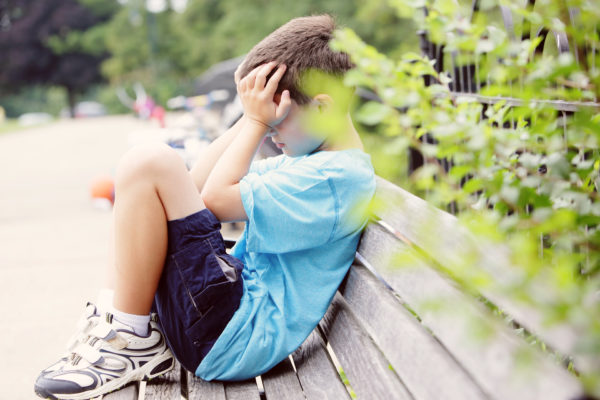Most parents – and their kids – are too embarrassed to even discuss bedwetting with a pediatrician.
But it’s quite common, says Dr. Bradley Dixon, a physician in the Division of Nephrology and Hypertension at Cincinnati Children’s Hospital Medical Center, and rarely a sign that anything is medically wrong with a child.
As many as 15 percent of 7-year-olds still wet the bed, Dixon says, and as many as 0.5 percent of adults have the same problem.
Just because it’s a common problem, though, it’s not easy to live with. Children who wet the bed can’t help it, and it’s an embarrassing and upsetting problem. Parents may worry that their children are too lazy to get up and go to the bathroom or that they have physiological or psychological problems.
In most cases, children wet the bed because the brain signals that tell the body the bladder is full haven’t fully matured, Dixon says. Other factors include smaller-than-average bladder capacity, higher urine production overnight or a higher level of bladder muscle activity.
Genetics are also a factor, he says. If one parent wet the bed as a child, odds are nearly 50 percent that his or her child will do the same.
And chronic constipation can lead to bedwetting. Stool in the rectum can put pressure on the bladder, causing urination. Treating the constipation aggressively over a course of months can often improve or resolve bedwetting.
Most children will quit wetting the bed on their own as they get older. An alarm can sometimes help, and a medication called ddAVP that reduces the production of urine at night can help too, though it’s not recommended for long-term use.
The main thing parents can do is to help their children understand that they’re not to blame for bedwetting, and that they shouldn’t be punished for it.
Disposable absorbent garments like PullUps can be useful for sleepovers or camping trips, and so can ddAVP.
In rare cases, bedwetting can be a sign of a more serious medical problem, including diabetes, kidney malformations, sleep apnea, or malformations or inflammation of the bladder itself.
If any of these warning signs are present, parents should make sure to discuss the problem with the child’s pediatrician:
- Burning or pain with urination
- Foul odor in the urine
- Visible blood in the urine
- Excessive thirst
- Excessive tiredness during the day, or heavy snoring during sleep
Dr. Dixon emphasizes that most kids who wet the bed do not have anything physically wrong with them. The bedwetting will improve either with no treatment as they get older or with the treatments that we’ve discussed above.
Patience will go a long way, as will reminders for the child that they are not to blame.







[…] Healthcare IT gets political- How Judy Faulkner and Epic Systems are destroying Interoperability EXCERPT FROM Healthcare IT ARTICLE- https://cincinnatichildrensblog.org/my-7-year-old-still-wets-the-bed-should-i-be-concerned/ […]
Yes, you should be concerned if your seven year old is still wetting the bed. Concerned needs to focus on more than the involuntary release of urine at night.
Since 1975, the Enuresis Treatment Center, has specialized in treating only bedwetting cases. We have treated thousands of children, teenagers and adult bedwetters around the globe, while tracking all related symptoms. Our extensive research finds bedwetting to be primarily a problem caused by abnormally deep sleep which doesn’t allow the bedwetter’s brain to respond to the bladder’s signal.
The genetically determined deep-sleep disorder results in bedwetting and more importantly produces a non-restorative sleep deprivation. This compromised sleep can also result in daytime symptoms; difficulty awakening, fatigue, memory difficulty, irritability, difficulty concentrating. Bedwetting is not JUST bedwetting. It is a complex problem that needs careful attention.
Dr. Dixon writes that the bedwetting will improve over time. Parents naturally turn to their pediatrician seeking information regarding their child’s bedwetting problem around five or six. Often the “Medical Advice” is to wait. This is the worst advice you can get. While the child waits, the enuresis can remain.
Bed wetting can continue into teen years, almost two million 15-19 year olds continue wetting the bed. Even young child can begin to feel different, burdened by shame and secrecy. Suffering continues with emotional pain and damage to self-esteem, especially when it extends into the teen years or beyond into adulthood.
Let’s look deeper into the emotions of someone who suffers from enuresis: Individuals who wet the bed almost always feel the shame of being “different” in that they cannot do what it seems everyone else can – keep their beds dry. They can suffer from near debilitating fear of discovery, especially if they experienced daytime control problems due to the weak bladder muscle control that results from the disorder and is not the cause of it.
An enuretic child, teenager or adult does not see his/her bed as a place of rest; instead it is a place they will fail.
Parents call us in tears because this problem was dismissed year after year as “normal” as their child, now a teenager, continues to wet the bed. College is around the corner.
Sadly, there is No guaranteed that someone will outgrow bedwetting, in fact after the age of seven, it is less likely. Over four million adults continues wetting. This number is only reported cases.
This compromised sleep can also result in daytime symptoms; difficulty awakening, fatigue, memory difficulty, irritability, difficulty concentrating. These symptoms can increase as a bedwetter reaches adulthood.
Many medical professionals misinform patients when they blame a small bladder as the cause of bedwetting. It is actually a RESULT of the bedwetting. Moreover, restricting fluids causes further underdevelopment of the bladder, as well as dehydration.
Rewarding a child or teen for a dry night only brings confusion and gives everyone the impression that the child has some control over the bedwetting.
Parents seeking to understand what is happening may wish to visit our website http://www.nobedwetting.com and find a great deal of information.
Regards,
Lyle Danuloff, Ph.D.
The Enuresis Treatment Center
248-785-1199
There are so many different things that can lead to bed-wetting. One more thing to think about is neurogenic enuresis. Chiropractic care can be of some benefit. I’m not saying that chiropractic can cure all bed-wetting but there are lots of cases where kids have had help as their neurology improved. It’s worth a phone call to your local chiropractor.
[…] consider wetting the bed to be a problem until your child is about seven years old. In fact, about 15% of seven-year-olds still have problems staying dry at least […]
As a parent of a boy that wet the bed, I’d say check with the dad to see if he was a bed-wetting child himself. After much frustration I found out that his dad was until 15, his father, his grandmother was also and apparently it can be hereditary. Just a thought, since I know the strain it puts on the mom and the child!!